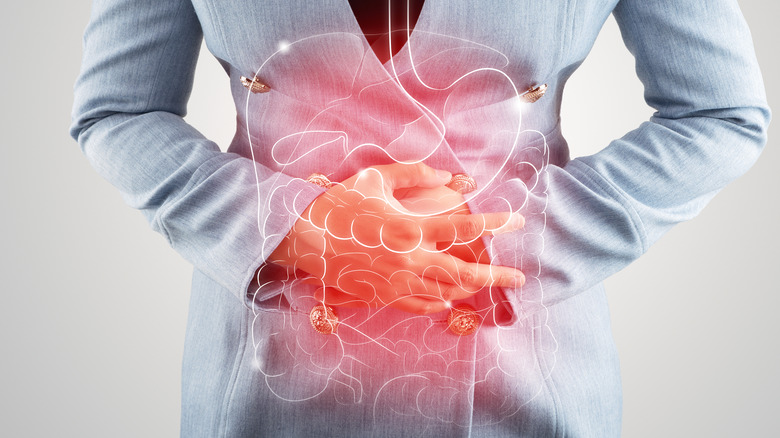Simple Diet Changes That Can Help Reduce Crohn's Disease Symptoms
When you learn little things that can be done to positively impact an existing health condition, it's like discovering treasure. Do you know these diet tips for reducing Crohn's symptoms?
Crohn's disease is an inflammatory condition that causes digestive tract swelling (per Mayo Clinic). The inflammation can spread anywhere throughout the digestive tract, such as the colon or intestines, and the location it affects differs from person to person. When you have Crohn's, you may or may not always have symptoms, and they can range from mild to severe. Common symptoms include abdominal pain, diarrhea, fever, fatigue, bloody stools, mouth sores, reduced appetite, and anal discharge. Other symptoms may also occur in more severe cases, such as kidney stones, joints, skin, eyes, and liver inflammation, anemia, and delayed development in children.
Although the exact cause is unknown, Crohn's is caused by either the immune system being set off and attacking its own cells or it is passed down through your genes. Regardless of the cause, it is directly linked to inflammation; therefore, most treatments focus on reducing it. Medications used include anti-inflammatories, immune system suppressors, and biologics, which often interfere with proteins made by the immune system. Surgery can also be performed to remove damaged portions of the digestive tract, but Crohn's can still return to the area after surgery. There is no cure for the disease, so finding a way to manage symptoms and improve quality of life is paramount.
Diet changes can be combined with other treatments
Once you've been diagnosed with Crohn's, a treatment plan will be put in place that may include some of the medications mentioned above, but a diet plan will likely also be recommended (via Healthline). Since trigger foods differ for each individual, and symptoms can occur in various areas of the digestive tract, it will be necessary to note what foods make things worse. In addition, some general tips can help reduce the severity and occurrences of your symptoms.
You may know water is essential to any diet or healthy lifestyle, but it is even more so for those with Crohn's. Not only may your digestive tract not be able to absorb water properly, but the diarrhea that may occur also causes dehydration. Similarly, your digestive tract may not be able to absorb nutrients from food. Supplemental multivitamins and minerals may be required in addition to a nutrient-dense diet. Fiber is vital to a healthy diet and can help some with Crohn's, but it may also trigger digestive tract issues.
Crohn's also interferes with the body's ability to absorb fats. Unprocessed fats can pass straight into the colon, which can cause diarrhea. Since fat is a significant aspect of dairy, it is wise to limit dairy intake to help reduce the severity of symptoms. Developing a lactose intolerance can lead to cramps and stomach aches. Keeping these simple dietary restrictions in mind can help your overall outlook for managing Crohn's disease.


